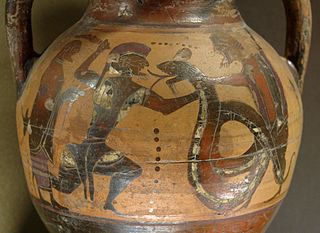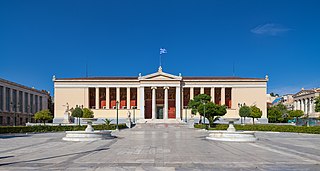Contents
This is list of archives in Greece.
This is list of archives in Greece.

Albania, officially the Republic of Albania, is a country in Southeastern Europe. It is located on the Adriatic and Ionian Sea within the Mediterranean Sea and shares land borders with Montenegro to the northwest, Kosovo to the northeast, North Macedonia to the east and Greece to the south. Tirana is its capital and largest city, followed by Durrës, Vlorë and Shkodër.

Athens is the capital and largest city of Greece. Athens dominates the Attica region and is one of the world's oldest cities, with its recorded history spanning over 3,400 years and its earliest human presence beginning somewhere between the 11th and 7th centuries BC.

The Bible is a collection of religious texts or scriptures sacred in Christianity, Judaism, Samaritanism, and many other faiths. It appears in the form of an anthology, a compilation of texts of a variety of forms, originally written in Hebrew, Aramaic, and Koine Greek. These texts include instructions, stories, poetry, and prophesies, among other genres. The collection of materials that are accepted as part of the Bible by a particular religious tradition or community is called a biblical canon. Believers generally consider the Bible to be a product of divine inspiration while understanding what that means in different ways.

The Balkans, also known as the Balkan Peninsula, is a geographic area in southeastern Europe with various geographical and historical definitions. The region takes its name from the Balkan Mountains that stretch throughout the whole of Bulgaria. The Balkan Peninsula is bordered by the Adriatic Sea in the northwest, the Ionian Sea in the southwest, the Aegean Sea in the south, the Turkish Straits in the east, and the Black Sea in the northeast. The northern border of the peninsula is variously defined. The highest point of the Balkans is Mount Musala, 2,925 metres (9,596 ft), in the Rila mountain range, Bulgaria.

Cyprus, officially the Republic of Cyprus, is an island country in the eastern Mediterranean Sea south of the Anatolian Peninsula. It is the third-largest and third-most populous island in the Mediterranean, and is located south of Turkey, west of Syria, northwest of Lebanon, Israel, and the Gaza Strip (Palestine), north of Egypt, and southeast of Greece. Its capital and largest city is Nicosia.

Greek is an independent branch of the Indo-European family of languages, native to Greece, Cyprus, southern Albania, and other regions of the Balkans, the Black Sea coast, and the Eastern Mediterranean. It has the longest documented history of any Indo-European language, spanning at least 3,400 years of written records. Its writing system is the Greek alphabet, which has been used for approximately 2,800 years; previously, Greek was recorded in writing systems such as Linear B and the Cypriot syllabary. The alphabet arose from the Phoenician script and was in turn the basis of the Latin, Cyrillic, Armenian, Coptic, Gothic, and many other writing systems.

Greece, officially the Hellenic Republic, is a country in Southeast Europe. It is situated on the southern tip of the Balkans, and is located at the crossroads of Europe, Asia, and Africa. Greece shares land borders with Albania to the northwest, North Macedonia and Bulgaria to the north, and Turkey to the northeast. The Aegean Sea lies to the east of the mainland, the Ionian Sea to the west, and the Sea of Crete and the Mediterranean Sea to the south. Greece has the longest coastline on the Mediterranean Basin, featuring thousands of islands. The country consists of nine traditional geographic regions, and has a population of approximately 10.7 million. Athens is the nation's capital and largest city, followed by Thessaloniki.

Latin is a classical language belonging to the Italic branch of the Indo-European languages. Latin was originally a dialect spoken in the lower Tiber area around present-day Rome, and through the power of the Roman Republic, became the dominant language in Italia and subsequently throughout the realms of Roman Empire. Even after the fall of Western Rome, Latin was the common language of international communication, science, scholarship and academia in Europe until well into the 18th century, when other regional vernaculars supplanted it in common academic and political usage, and it eventually became a dead language in the modern linguistic definition.

Thessaloniki, also known as Thessalonica, Saloniki or Salonica is the second-largest city in Greece, with over 1 million inhabitants in its metropolitan area, and the capital of the geographic region of Macedonia, the administrative region of Central Macedonia and the Decentralized Administration of Macedonia and Thrace. It is also known in Greek as η Συμπρωτεύουσα, literally "the co-capital", a reference to its historical status as the Συμβασιλεύουσα or "co-reigning" city of the Byzantine Empire alongside Constantinople.

Tzatziki, also known as tarator or cacık, is a dip, soup, or sauce found in the cuisines of Southeast Europe and the Middle East. It is made of salted strained yogurt or diluted yogurt mixed with cucumbers, garlic, salt, olive oil, sometimes with vinegar or lemon juice, and herbs such as dill, mint, parsley and thyme. It is served as a cold appetizer (mezze), a side dish, and as a sauce for souvlaki and gyros sandwiches and other foods.

Ancient Greek includes the forms of the Greek language used in ancient Greece and the ancient world from around 1500 BC to 300 BC. It is often roughly divided into the following periods: Mycenaean Greek, Dark Ages, the Archaic period, and the Classical period.

In ancient Greek religion and mythology, the twelve Olympians are the major deities of the Greek pantheon, commonly considered to be Zeus, Hera, Poseidon, Demeter, Athena, Apollo, Artemis, Ares, Hephaestus, Aphrodite, Hermes, and either Hestia or Dionysus. They were called Olympians because, according to tradition, they resided on Mount Olympus.
The Greek alphabet has been used to write the Greek language since the late ninth or early eighth century BC. It is derived from the earlier Phoenician alphabet, and was the earliest known alphabetic script to have distinct letters for vowels as well as consonants. In Archaic and early Classical times, the Greek alphabet existed in many local variants, but, by the end of the fourth century BC, the Euclidean alphabet, with twenty-four letters, ordered from alpha to omega, had become standard and it is this version that is still used for Greek writing today.

The Super League Greece 1, or Super League 1 Interwetten for sponsorship reasons, is the highest professional association football league in Greece. The league was formed on 16 July 2006 and replaced Alpha Ethniki at the top of the Greek football league system. It consists of 14 teams and runs from August to May, with teams playing 26 games each followed by a 10-game play-off to decide the champions.

The National and Kapodistrian University of Athens, usually referred to simply as the University of Athens (UoA), is a public university in Athens, Greece.

Various lists of the Wonders of the World have been compiled from antiquity to the present day, in order to catalogue the world's most spectacular natural features and human-built structures.

The Seven Wonders of the World or the Seven Wonders of the Ancient World is a list of remarkable constructions of classical antiquity given by various authors in guidebooks or poems popular among ancient Hellenic tourists. Although the list, in its current form, did not stabilise until the Renaissance, the first such lists of seven wonders date from the 2nd–1st century BC. The original list inspired innumerable versions through the ages, often listing seven entries. Of the original Seven Wonders, only one—the Great Pyramid of Giza, oldest of the ancient wonders—remains relatively intact. The Colossus of Rhodes, the Lighthouse of Alexandria, the Mausoleum at Halicarnassus, the Temple of Artemis and the Statue of Zeus were all destroyed. The location and ultimate fate of the Hanging Gardens are unknown, and there is speculation that they may not have existed at all.

Giannis Sina Ugo Antetokounmpo is a Greek professional basketball player for the Milwaukee Bucks of the National Basketball Association (NBA). Antetokounmpo's nationality, in addition to his size, speed and ball-handling skills have earned him the nickname "Greek Freak".